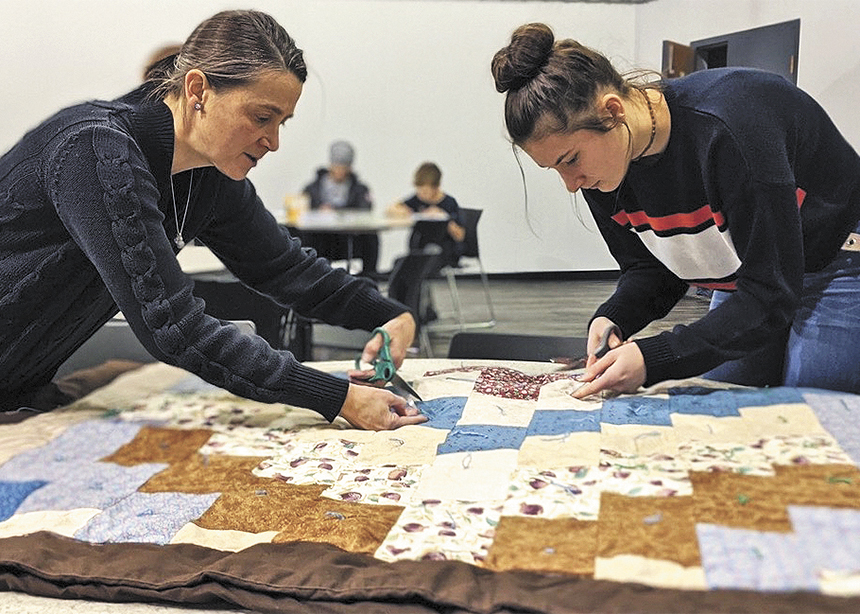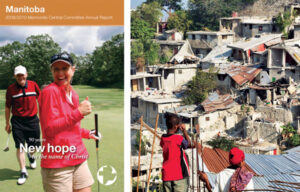“One bar of soap isn’t just a drop in the ocean of need. The ripples keep moving out in ways we may not even be able to count.”
Sophia Bezoplenko, who coordinates material resources for Mennonite Central Committee (MCC) in Winnipeg, insists that “the small things are not as small as we think.” The reality of the pandemic, she says, “makes us aware of the impact one bar of soap could make” for one person’s health and that of their family.
Bezoplenko was taking part in MCC’s monthly webinar series, sharing stories about the organization’s work in Canada and around the world. The webinar she took part in, called “From hearts to hands: Material resources,” highlighted meaningful volunteer opportunities in Canada for people making and packing material resources, such as comforters and hygiene kits, and the impact of those gifts on recipients.
The webinars allow MCC to connect with its constituency and provide a “behind-the-scenes look” at its service in the name of Christ. Two of the five webinars address how MCC is responding to COVID-19, and a growing global food crisis, drawing on experts in the field and their partners.
The episode called “Working toward right relationships” highlights MCC’s Indigenous Neighbours program, and features Bridget Findlay, coordinator in British Columbia, and Beverly Lightfoot, a partner and friend of MCC from the Cree community.
Findlay describes how the Kairos blanket exercise—a participatory history lesson—is a powerful tool in her educational work with churches. She challenges churches to make reconciliation work an ongoing commitment rather than a one-time project to check off a to-do list.
Lightfoot speaks to the transformative power of these kinds of “participatory exercises” that call people to re-examine their biases and stereotypes.
The next webinar, called “Advocacy for peace and justice: Conversations from the field,” and scheduled for Sept. 24, will focus on MCC’s advocacy work in Israel, Palestine and Latin America for marginalized and displaced persons.
Each webinar is recorded and includes time for questions and answers. Participants are invited to sign up ahead of time. The webinars are hosted by MCC Canada’s executive director, Rick Cober Bauman, sporting a different bowtie each month.
In a similar vein, Ken Ogasawara, part of the communications and community engagement team at MCC Ontario, is experimenting with a new way of sharing what he calls the “incredible stories we are privileged to hear.” He hosts a podcast called “Undercurrents.” There are six episodes featuring stories from staff, program participants, volunteers and others.
In the episode called “Being Jesus,” Pete Olson, who runs the Toronto Ontario Opportunity for Service and Learning program, describes his approach. “I push them hard,” he says, referring to participants who come with common stereotypes about people experiencing homelessness. After the interactive two- to four-day programs in downtown Toronto, Olson challenges them to be “Matthew 25 Christians” by asking, “What will you do when you go home?”
In that episode, Ogasawara also explores research and stories about how “housing-first” programs in various cities are addressing complex needs of people who are homeless.
Another episode features the story of Maria, who found “radical acceptance” from staff in MCC’s restorative justice program, helping her to cross the bridge from prison to community life, and begin to overcome her isolation, stigma and shame.
A new podcast from MCC Canada called “Relief, Development and Podcast” helps people stay connected with each other and with the realities faced by displaced and vulnerable people around the world. Podcasts include stories from the field, special guests and updates about MCC’s peace and justice work.
In one episode, Annalee Giesbrecht and Paul Fast share the story of how MCC partners contributed to the elimination of cholera cases in two remote communities in Haiti, and how these lessons can be applied to a COVID-19 response.
In another episode, Mulanda Jimmy Juma shares about how his experience as a displaced person helps inform his work for MCC in the Democratic Republic of the Congo, where efforts to prevent COVID-19 in camps for displaced people are a top priority. Cindy Klassen, former Olympic speedskating medallist, reflects with host Scott Campbell about her life now and why she supports the work of MCC.
Like many other organizations, MCC’s finances have been affected by the pandemic. According to Campbell, director of communications and donor relations for MCC Canada, COVID-19 forced MCC, like many charities, “to think creatively about connecting our faithful and generous supporters with the impact they are having here in Canada and around the world.” The webinars and podcasts allow them “to hear directly from the people involved with MCC projects, ask them questions, and see behind the scenes of relief, development and peace in the name of Christ.”
He says the format of interviews and storytelling is a “unique opportunity to look at the work of MCC from a different perspective, with different voices, and dig deep into important themes that define the work, or [that] supporters care about.”
Response has been positive. Listeners express appreciation for the insightful guests, and the opportunity to ask questions in the webinars.
Campbell says MCC will continue producing the podcast and webinar until the end of 2020, when it will review and plan for 2021.
Do you have a story idea about Mennonites in Eastern Canada? Send it to Janet Bauman at ec@canadianmennonite.org.
Related stories:
MCC responding to explosion in Beirut
EU grant helps MCC support peacebuilding projects in Middle East
MCC announces program cuts, changes due to COVID-19











Leave a Reply
You must be logged in to post a comment.